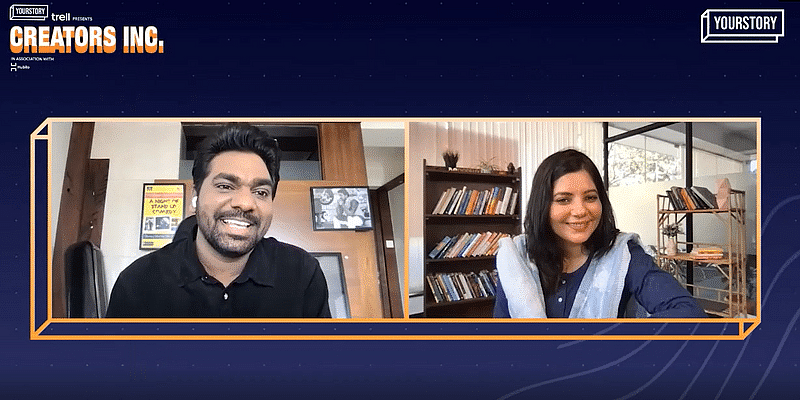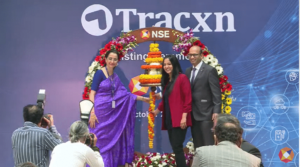Comedian extraordinaire Zakir Khan wears many hats today. He started his career as a radio jockey (RJ), is a prolific sitar player, writes poetry, has mentored aspiring comedians, has acted in TV shows and movies, and is best known for his comedic take on modern India.
But success didn’t come easy — it was hard work, a lot of belief, and many countless hours of toil that oftentimes led to sleepless nights and sacrificing meals in a day to save enough money to keep going, he recalls in a heart-to-heart chat with YourStory Founder and CEO, Shradha Sharma, on day two of the Creators Inc 2022 that coalesces all parts of the creator ecosystem
And where regular people would have become jaded with the industry and a lack of support from people who had “made it in the industry”, Zakir took his own route and decided that, instead of holding grudges, he would find some way to learn something from those who looked down on him.
He also credits his parents for his ability to connect with people. Zakir remembers a time there used to be so many people in the ‘aangan’ (verandah) of his house to hear his father, an accomplished sitarist, play, that when they’d leave, it would feel like people were vacating a movie hall.
“I learned from my parents ki logo ko apna kaise banate hain (how to make people feel like family)…saara khel baat-cheet ka hai (it’s all about conversations with people),” Zakir says.
“Main noor banke jamane main phail jaunga, tum aftaab main keede nikalte rehna (I will take over the world with my light, you can keep looking for spots in the sun),” Zakir recites, quoting Rahat Indori, an Urdu poet and Indian lyricist.
“I try to learn from everyone and it has changed my perception. My thinking today is ‘dushmano se bhi seekh ke aayenge (I will learn from my enemies)’,” he quips.
On being ‘besharam’
When Zakir was just starting out his career, he used to play the sitar in restaurants, twice or thrice a week, to earn a little extra pocket money. From his pedestal where he used to sit and play, he had a view of the entire restaurant, and he could see people coming in and out of the restaurant.
He turned that motion into a game — every time someone would enter the restaurant, he would try and guess in his head what dishes they were likely to order, he would observe how they behaved, what they ate, how much they spent.
“It taught me a lot about people, it also helped me realise that I love people, their lives, and their conversations.”
He admits that because of that game and his love for people and conversations, he sometimes reaches venues and meetings late because he gets so engrossed in conversations with random people he meets on his way.
“I’ve often reached places late because I sparked a conversation with the driver and his life interested me. Most of my time goes in getting unnecessarily involved in other people’s lives and ‘bakaiti’ (talking a lot, unnecessarily),” Zakir chuckles.
Growing up though, he says wasn’t the outspoken, vociferous person he is today, and he had to learn how to voice himself the hard way — by embarrassing himself in front of people and constantly being ridiculed. And even though it hurt, one fine day he decided he wasn’t going to let it affect him anymore, because the opportunity cost of not speaking up was greater than being derided.
“Besharam hone ke faayde bahut zyada hote hain (there are many merits in being shameless). I don’t hesitate to talk to anyone today, and I’m ready to get insulted 100 times if it means I get to learn something new,” he quips, acknowledging that he knows being someone who asks for things isn’t the textbook definition of “being cool”.
“But when I realised that I didn’t fit into the ‘textbook definition’ of cool, maine book hi badal di (I rewrote the text).”
Romantically though, he still struggles, Zakir adds coquettishly.
His biggest advice for new content creators or people who aspire to create content today is to be ‘besharam’ and ask for what they think they deserve, and settle for nothing less than that, especially when it comes to money or being paid for the work they do.
As for when he plans to stop being a content creator himself, he says it’s his father’s call.
“Waalid sahab told me ‘bada aadmi banna hai’ (my father told me that you have got to make it big in life), but he did not tell me how to do that or how much to do. I’m working off his brief today also, so the day he says ‘you’ve done it, you’ve made it’, I’ll stop,” the silver-tongued comedian concludes.
Catch YourStory’s Creators Inc conference here.
For more on other key initiatives as part of the conference, visit our Creators Inc. website here.
Recognising the burgeoning creator ecosystem and the new wave of entrepreneurship that comes with it, YourStory is celebrating the works of both established and emerging influencers in an initiative aimed at identifying, celebrating and accelerating the journey of digital creators who make extraordinary, unique and engaging content. We’ve partnered with Trell to bring you the Top 100 Creators challenge, which you can apply for here.










